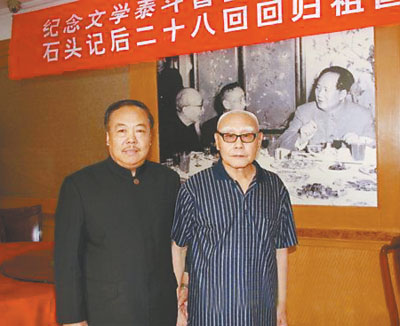|

Wang Yuanyuan
cheekywang@hotmail.com
A CHINESE scholar recently claimed that he brought back the lost chapters of the well-known Chinese novel, “A Dream of Red Mansions,” from a late British researcher, Joseph Needham (1900-1995).
The scholar, identified as Zhang Guilin, said he rewrote the last 28 chapters of the novel according to Needham’s suggestions with some 200-year-old manuscripts collected by Needham.
Written in the 18th century by Cao Xueqin, “A Dream of Red Mansions” is considered a masterpiece of Chinese literature and is generally acknowledged to be the pinnacle of Chinese fiction. It is believed to be semi-autobiographical, mirroring the rise and decay of Cao’s own family and, by extension, of the Qing Dynasty (1644-1911). Because of Cao’s tragic life and the novel’s significant influences in Chinese literature, mysteries have been raised around the novel, which has made Redology a popular field of study devoted exclusively to this work.
One of the biggest mysteries concerning the novel is its ending. It is commonly believed that Cao did not finish the book before he died. To increase sales of the novel, some publishers commissioned other authors to finish the novel. Therefore, there were different endings of the novel, including some which had been lost over time. The version written by a Qing-Dynasty scholar, Gao E, was considered as the most acceptable one.
Zhang claimed that Emperor Qianlong of the Qing Dynasty banned the last 28 chapters of Cao’s novel due to some political reasons when the novel was finished. “The novel was originally named ‘The Story of the Stone.’ Emperor Qianlong ordered to destroy the last 28 chapters and commissioned Gao to rewrite another 40 chapters as the ending. He later renamed the novel as ‘A Dream of Red Mansions,’” Zhang said at a press conference in Beijing on Sept. 28.
“However, a copy of the manuscript was saved by Cao’s friend Zhang Yiquan. Zhang gave the manuscript to a foreign missionary and the missionary brought the manuscript overseas. Needham found the manuscript at a library and had held it as his collection before giving it to me.”
Zhang’s press conference soon drew wide attention in the country. Many people expressed their doubts.
“If the manuscripts were the original ones, why would Zhang rewrite the ending? We have a lot of leading Redologists in the country. What did they say about the manuscripts?” some netizens said.
In fact, Zhang did not show the manuscripts to the public at the press conference. “Zhang was very careful about the manuscripts, saying that the manuscripts could not be shown to the others casually,” said Zhang Yesheng, one of the co-organizers.
“They were anxious to hold the press conference. We went there, and found there was some unchecked information. This is a very big thing in the field and a piece of history. We need to get to know everything and confirm everything before saying anything. I did not see the manuscripts, so I also have a lot of questions which I want to ask.”
Zhang claimed that Needham, a well-known researcher on science and civilization in China, had been a great friend of his for more than 15 years. But the statement was challenged by John Moffett, a librarian at the East Asian History of Science Library at the Needham Research Institute of Cambridge University, who believed that the two had never met. “I think that they only contacted each other with a few letters,” Moffett told a Chinese-language newspaper.
Moffett has been the librarian of the institute since 1992 and still remembers Zhang. “Zhang once sent his book to the institute as he wanted Needham to help him publish in Britain. Needham replied to him politely, saying that it was an interesting book, but he did not accept the requirement,” Moffett said.
“I did not know that Needham had spent time researching ‘A Dream of Red Mansions.’ He knew this book, but he only had some ordinary versions of the book, definitely not including the original manuscript.”
Responding to the doubts, Zhang said that he did not have the “original manuscripts,” just some “compiled manuscripts.”
Hu Wenbin, consultant from the Chinese Association of Redology, said that the manuscripts must be reviewed and evaluated by some authorized departments before making any conclusion.
“Needham was a well-known scientist. If he had such important manuscripts, he must have made some records such as where he got the manuscripts and how much it cost,” He said. “Meanwhile, paper and ink of the manuscripts must be evaluated by advanced technology. It is better to get a certificate, too. Content of the scripts should also be reviewed by Redologists.”
Hu believed that the current last 40 chapters were actually written by Cao, not Gao. “Cao said in the first chapter that he had already finished the index of the novel, while Zhi Yanzhai, an well-known ancient scholar who was well-known for reviewing the original novel, also mentioned the last chapters of the original novel. Some contents he mentioned were the same as the one written by Gao.”
|

